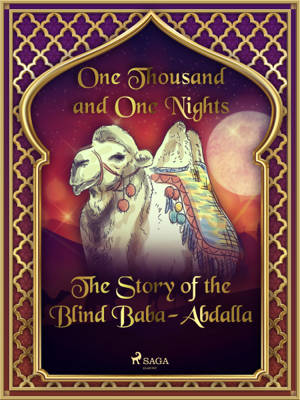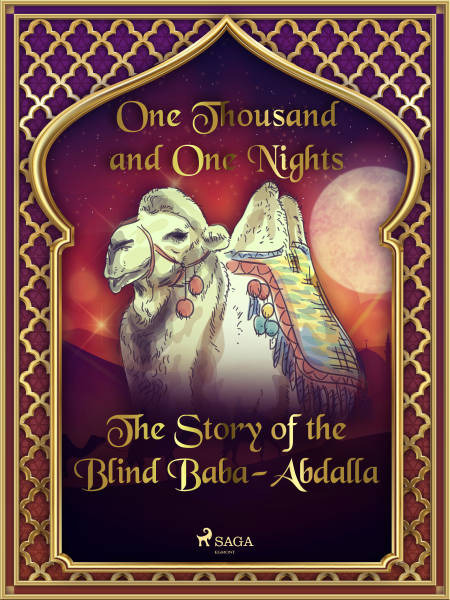
- Retrait gratuit dans votre magasin Club
- 7.000.000 titres dans notre catalogue
- Payer en toute sécurité
- Toujours un magasin près de chez vous
- Retrait gratuit dans votre magasin Club
- 7.000.0000 titres dans notre catalogue
- Payer en toute sécurité
- Toujours un magasin près de chez vous
Description
Baba-Abdalla has worked his whole life to increase the fortune he was born with, and now owns eighty camels. On one of his business trips, he comes across a poor dervish, who reveals the location of a fortune in buried treasure. The dervish is willing to share it with Baba-Abdalla in exchange for forty camels – a fair price, surely? But as the proverb says, "the more one has, the more one wants". See the true cost of greed in "The Story of the Blind Baba-Abdalla", the thirtieth of the 34 tales in the classic "Arabian Nights" collection, translated by Andrew Lang.
A treasure-trove of timeless stories, the One Thousand and One Nights or Arabian Nights have been loved, imitated, and added to over many centuries. Similar to the fairy tales collected by the Brothers Grimm, the Arabian Nights are drawn from the folklore of India, Iran and the Middle East, and were collected in Arabic versions throughout the medieval period; others were added as recently as the eighteenth century. These stories of the exotic East have been popularised for new generations by film adaptations such as Disney’s Aladdin, starring Robin Williams and Gilbert Gottfried in 1992, and Will Smith in 2019, and Dreamworks’ Sinbad, starring Brad Pitt and Michelle Pfeiffer. They continue to inspire writers as varied as Salman Rushdie and Neil Gaiman, while numerous Bollywood and manga versions attest to their popularity around the world. These stories of magic, adventure and romance have shaped readers’ imaginations for generations, and are sure to be retold for years to come.
This selection was translated by Andrew Lang from the French versions by Antoine Galland, who was the first to include the stories of Aladdin and Ali Baba. Born in Scotland in 1844, Lang was a scholar of ancient Greek, a journalist, historian, novelist and poet, and the author of 25 popular collections of fairy tales; his edition of the Arabian Nights’ Entertainment was published in 1898. He became a Fellow of the British Academy in 1906, and died in 1912.
A treasure-trove of timeless stories, the One Thousand and One Nights or Arabian Nights have been loved, imitated, and added to over many centuries. Similar to the fairy tales collected by the Brothers Grimm, the Arabian Nights are drawn from the folklore of India, Iran and the Middle East, and were collected in Arabic versions throughout the medieval period; others were added as recently as the eighteenth century. These stories of the exotic East have been popularised for new generations by film adaptations such as Disney’s Aladdin, starring Robin Williams and Gilbert Gottfried in 1992, and Will Smith in 2019, and Dreamworks’ Sinbad, starring Brad Pitt and Michelle Pfeiffer. They continue to inspire writers as varied as Salman Rushdie and Neil Gaiman, while numerous Bollywood and manga versions attest to their popularity around the world. These stories of magic, adventure and romance have shaped readers’ imaginations for generations, and are sure to be retold for years to come.
This selection was translated by Andrew Lang from the French versions by Antoine Galland, who was the first to include the stories of Aladdin and Ali Baba. Born in Scotland in 1844, Lang was a scholar of ancient Greek, a journalist, historian, novelist and poet, and the author of 25 popular collections of fairy tales; his edition of the Arabian Nights’ Entertainment was published in 1898. He became a Fellow of the British Academy in 1906, and died in 1912.
Spécifications
Parties prenantes
- Auteur(s) :
- Traducteur(s):
- Editeur:
Contenu
- Nombre de pages :
- 4
- Langue:
- Anglais
- Collection :
Caractéristiques
- EAN:
- 9788726593259
- Date de parution :
- 17-11-21
- Format:
- Ebook
- Protection digitale:
- Digital watermarking
- Format numérique:
- ePub

Les avis
Nous publions uniquement les avis qui respectent les conditions requises. Consultez nos conditions pour les avis.






